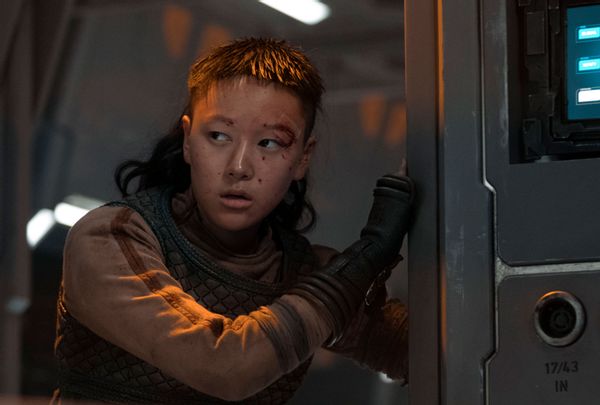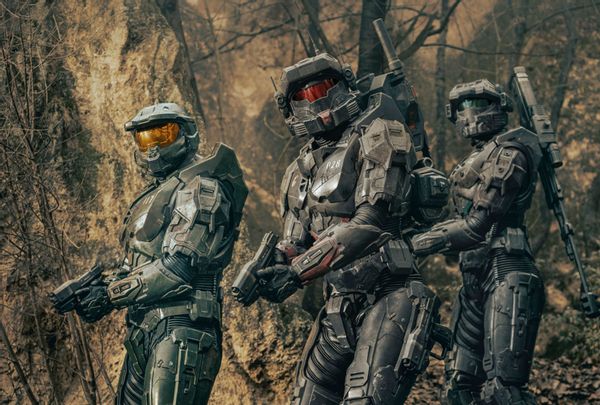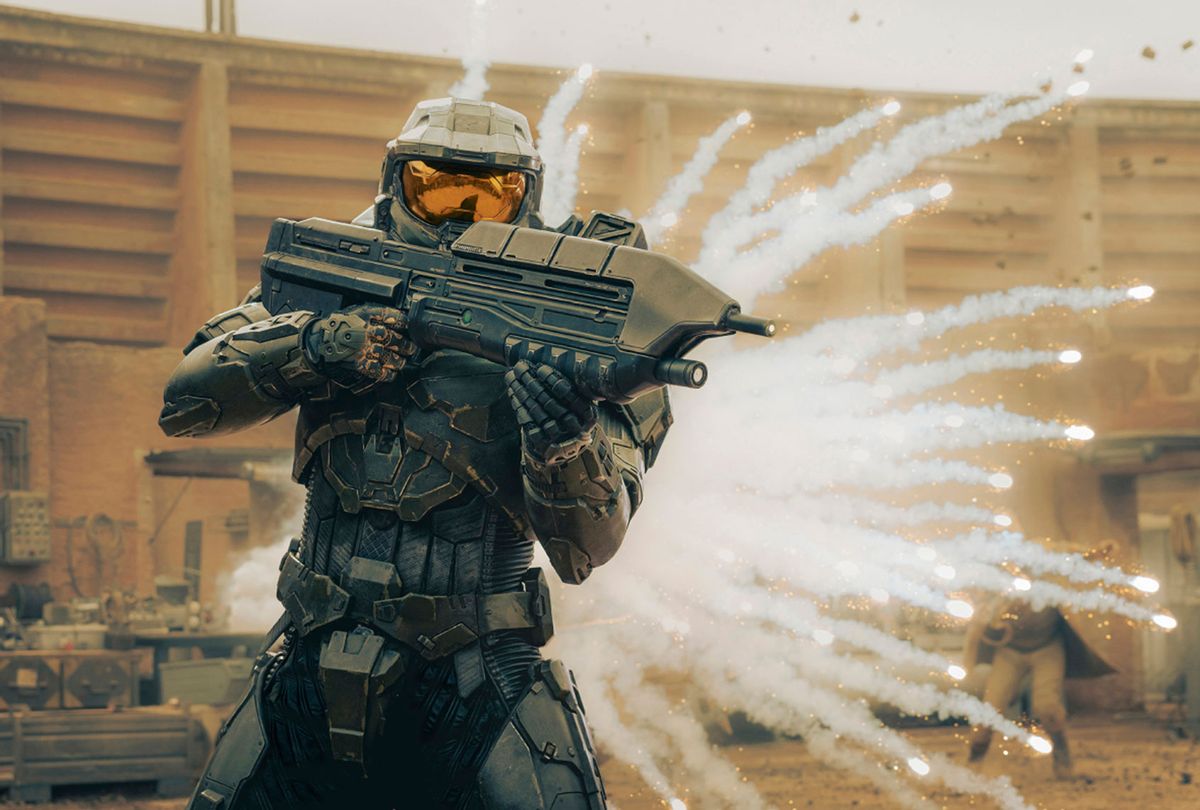Fans of the game are right to greet the long-awaited TV adaptation of "Halo" with apprehension.
Producers and directors have a long history of mucking up video games' transitions from the console to screen, often creating a non-playable cinematic instead of a show that stands on its own. There's nothing more frustrating than a mediocre screen adaptation that robs would-be players of the agency to maneuver into more exciting territory and viewers of a story with soul.
Additionally, this "Halo" project has been in the kitchen in some form for 17 years. Originally it was envisioned as a movie (which was to be directed by Peter Jackson) before morphing into a TV show produced by Steven Spielberg's Amblin Television, along with leaping from Showtime to Paramount + and filtering through the sensibilities of multiple showrunners. Whenever this happens the likelihood of blandness increases.
RELATED: "The Witcher" gives women their due
While the opening pair of episodes provided for review are not enough to determine whether "Halo" hits its mark, it does display a few signs of trying to appeal to everyone – gamers and non-gamers alike – while not definitively pleasing anyone. As an avid genre fan who's familiar with the game but not particularly passionate about it, the first couple of episodes represent a decent start that, despite its best efforts, failed to stun me. But it didn't drive me away, either.
Without question, one detail the producers got right is casting Pablo Schreiber ("American Gods," "Orange Is the New Black") as Master Chief. The man has range, and that makes the possibility of what he could bring to "Halo" exciting.
However, that hope is heavily based on speculation. Whatever expressiveness Schreiber indulges in during the first two episodes is bound in large part by limitations baked into the two-dimension character of Master Chief. And showrunner Steven Kane immediately tests those long-established restrictions in ways worth contemplating.
"Halo" arrives on the heels of the game's 20th anniversary and leans into the franchise's expansive mythology by loading a solid arsenal of known characters and new. Those familiar with its futuristic history know this period as the insurrectionist era coinciding with first contact with an alien race of zealots known as the Covenant.
The show begins in the year 2552, when miners on the planet Madrigal are battling for independence from the Unified Earth Government, one of many colonies in conflict with Earth and the United Nations Space Command's Marines.
But the UEG's cybernetically and biologically enhanced super soldiers known as Spartans are beyond the average rebel's capability. Central to the Spartans' programming is a complete erasure of memories and identity, along with muted sensation and emotional response. They can understand what other people say, but they only follow orders from commanders who are perfectly fine with dusting civilians.
Strongest among the Spartans is Master Chief (Schreiber), whose helmeted visage is the face of UNSC propaganda. To Madrigal rebels like Kwan Ha (Yerin Ha), Master Chief is the spokesmodel for their oppression.
 Yerin Ha as Kwan Ha in "Halo" (Adrienn Szabo/Paramount+)When Covenant soldiers land on Madrigal before the Marines, its population realizes there are more fearsome constituencies in the galaxy than other power-hungry humans. A brutal, graphically violent action scene establishes the Covenant's mindless butchery as a prelude to Master Chief and his fellow Silver Team Spartans' intervention.
Yerin Ha as Kwan Ha in "Halo" (Adrienn Szabo/Paramount+)When Covenant soldiers land on Madrigal before the Marines, its population realizes there are more fearsome constituencies in the galaxy than other power-hungry humans. A brutal, graphically violent action scene establishes the Covenant's mindless butchery as a prelude to Master Chief and his fellow Silver Team Spartans' intervention.
If you're into that type of thing, as one assumes many gamers are, this introduction plays out satisfyingly enough. Kane and the producers translate the game's first-person shooter perspective about as well as a show like this could, with the Spartan actors gymnastically leaping and flipping around to make their gunplay more kinetic than most of what we saw on "The Book of Boba Fett." The title's dedicated use of firearms narrows the balletic possibilities that would otherwise be available if they had other weapons; still, it's crisply executed.
Whiffing a confrontation like this wouldn't necessarily doom other shows as long as the rest of the script clicks into place. But in a video game adaptation, where the target audience's main interface with the story has been by way of such passages, rendering them correctly is essential. Of course, the main event happens after the battle, when Master Chief discovers an unidentifiable object in a cave that activates when he touches it. This opens the door to the main Halo story, but its immediate effects have a significant consequence for Schreiber's character.
Beyond the Spartans' first field mission, the rest of the premiere revolves around standard paint-by-numbers political machinations at the military's headquarters on the planet Reach. On one side is Dr. Halsey (Natascha McElhone), the scientist in charge of the Spartan program who has more command over them than her colleagues know. On the other is a military council more concerned with maintaining control over the colonies than expanding the Spartan program.
Between are the soldiers and survivors like Kwan, who can be quickly swept aside as collateral damage. And there's the matter of that artifact, whose import remains a mystery.
Want health and science stories in your inbox? Subscribe to Salon's weekly newsletter The Vulgar Scientist.
Even if you've never played the game, "Halo" is simple to comprehend. Probably too simple. Absolutely nothing you'll see here that hasn't already played out in other very popular sci-fi series and movies, from the landscape to the skirmishes.
Madrigal could be Tatooine or Arrakis or any other desert planet other genre authors envision as the antithesis of our blue planet.
The existential conflict between humankind and an alien "other" that can't be reasoned with is akin to the crises driving "Battlestar Galactica" and the "Starship Troopers" flicks. We've also fallen in love with another version of the "Halo" savior type – as in, a taciturn, helmeted antihero created in the tradition of The Man with No Name – by way of the "Star Wars" fine family of movies, toys, products and programs.
 Halo (Adrienn Szabo/Paramount+)Using a known structure doesn't necessarily damn a show like this since, again, there's an extensive mythology to play with that guarantees its already picked-up second season will have many routes to explore.
Halo (Adrienn Szabo/Paramount+)Using a known structure doesn't necessarily damn a show like this since, again, there's an extensive mythology to play with that guarantees its already picked-up second season will have many routes to explore.
Two episodes wasn't enough for anyone besides McElhone to distinguish themselves – and that's probably fine, since she's one of the most important figures in the game next to Master Chief and her other great invention, the artificial intelligence Cortana (which, as in the game, is voiced by Jen Taylor), who we don't even meet in these episodes. McElhone makes Halsey tough to peg, smiling at developments that strike horror in her colleagues in the way of a maternal Dr. Frankenstein.
And the visual effects are competent, particularly in the computer graphics-illustrated Covenant home world filled with alien creatures that either look like large sea bugs or crosses between bipeds and giraffes.
Schreiber's burden is the most significant, for obvious reasons, but also due to a potentially sacrilegious decision on the producers part that "Halo" diehards with either love or rebel against immediately.
Although this detail has been widely reported, if you don't know what this refers to, feel free to skip the next four paragraphs.
The fact that Master Chief – like the hero of "The Mandalorian" before the first season finale, and Boba Fett prior to "The Mandalorian" – never shows his face in the video games is central to his legend. There's a practical reason for this – its makers want anybody to feel like they can be Master Chief, making him accessible to the widest possible spectrum of players.
Where a game's mission is external, drama series require interior growth externalized through its main character. Since the show makes it Master Chief's mission to figure out who he is along with reclaiming his moral compass, putting Schreiber's face to the character is essential. Hence, Schreiber takes off Master Chief's helmet in the first episode.
Certainly this also gets around the question of whether Schreiber is inside that suit or phoned in his lines from a spa someplace while a double sweated through the character's paces. That might seem like a joke, but its one that follows Pedro Pascal each time "The Mandalorian" is on. Plus, it allows Schreiber to prove how passionate he is about playing a part to which he's been attached for many moons.
But it also allows him to access an expressive flexibility his robotic costume doesn't easily allow. That's a boon to the story, because Schreiber has decent chemistry with co-stars like Bokeem Woodbine, who turns up in the second episode, and he pairs well enough with Ha in the scenes they share. Even with this leeway his ability to emote is limited. One wonders how much individuality he'll be able to give this character.
Then again, this is not Shakespeare we're contemplating here, nor anything from the "Star Trek" universe or other profound, complex parables about humanity rendered on the canvas of deep space. It's a brawny tale attempting to imbue its shoot-'em-up action with brains and, if not a soul, then an intriguing level of artificial intelligence. As a show "Halo" might get there. Until it does, you can take matters into your own hands via your gaming system…or your remote.
"Halo" premieres on Thursday, March 24 on Paramount +, with new episodes dropping weekly. Watch a trailer for it below, via YouTube.
More stories like this:



Shares